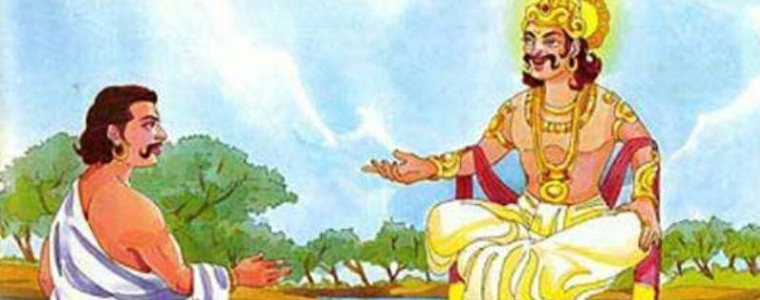The Art of Giving
"Rivers do not drink their own water, nor do tree eat their own fruit, nor do
rain clouds eat the grains reared by them. The wealth of the noble is used
solely for the benefit of others?
Even after accepting that giving is good and that one must learn to give,
several questions need to be answered:.
The first question is when should one give?
We all know the famous incident from the Mahabharata.
Yudhisthir, asks a beggar seeking alms to come the next day. On this, Bhim
rejoices, that Yudhisthir his brother, has conquered death! For he is sure that
he will be around tomorrow to give. Yudhisthir gets the message.
One does not know really whether one will be there tomorrow to give! The time to
give therefore is now.
The next question is how much to give?
One recalls the famous incident from history. Rana Pratap was reeling after
defeat from the Moghals. He had lost his army, he had lost his wealth, and most
important he had lost hope, his will to fight. At that time in his darkest hour,
his erstwhile minister Bhamasha came seeking him and placed his entire fortune
at the disposal of Rana Pratap. With this, Rana Pratap raised an army and lived
to fight another day.
The answer to this question how much to give is "Give as much as you can!
The next question is what to give?.
It is not only money that can be given. It could be a flower or even a smile.
It is not how much one gives but how one gives that really matters. When you
give a smile to a stranger that may be the only good thing received by him in
days and weeks! "You can give anything but you must give with your heart!
One also needs answer to this question whom to give?.
Many times we avoid giving by finding fault with the person who is seeking.
However, being judgmental and rejecting a person on the presumption that he may
not be the most deserving is not justified. Give without being judgmental!
Next we have to answer How to give?
Coming to the manner of giving, one has to ensure that the receiver does not
feel humiliated, nor does the giver feel proud by giving.
In giving follow the advice, Let not your left hand know what your right hand
gives? Charity without publicity and fanfare is the highest form of charity.
'Give quietly!
While giving let not the recipient feel small or humiliated. After all what we
give never really belonged to us. We come to this world with nothing and will go
with nothing. The thing gifted was only with us for a temporary period. Why then
take pride in giving away something which really did not belong to us? Give with
grace and with a feeling of gratitude.
When you help someone in need, give it before he asks for it; for if you place
him under the necessity of stretching out his hand, you take away from him his
self-respect which is worth more than the value of your alms.
What should one feel after giving?
We all know the story of Eklavya. When Dronacharya asked him for his right thumb
as "Guru Dakshina", he unhesitatingly cut off the thumb and gave it to
Dronacharya.
There is a little known sequel to this story. Eklavya was asked whether he ever
regretted the act of giving away his thumb. He replied, and the reply has to be
believed to be true, as it was asked to him when he was dying.
His reply was "Yes! I regretted this only once in my life. It was when Pandavas
were coming in to kill Dronacharya who was broken hearted on the false news of
death of his son Ashwathama and had stopped fighting. It was then that I
regretted the loss of my thumb. If the thumb was there, no one could have dared
hurt my Guru.
The message to us is clear. Give and never regret giving!
And the last question is How much should we provide for our heirs?
Ask yourself 'are we taking away from them the gift of work'? - A source of
happiness! The answer is given by Warren Buffett: "Leave your kids enough to do
anything, but not enough to do nothing!
Saint Kabir:
"When the wealth in the house increases, when water fills a boat, Throw them
with both hands "
Mary Angelou
"Success is liking yourself, liking what you do and liking how you do it"









